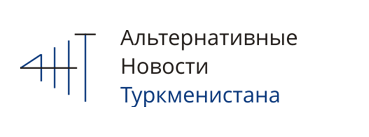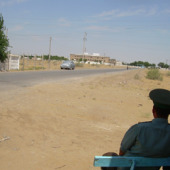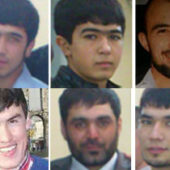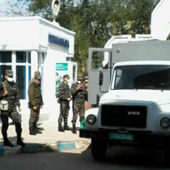By Felix Corley, Forum 18
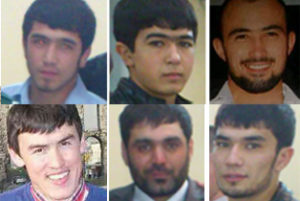 Two Muslims jailed for attending meetings in Turkmenabad died in top-security Ovadan-Depe prison. At least one had been beaten there. Relatives were ordered not to reveal the state of their bodies, but one weighed only 25 kilogrammes. Interior Ministry officials refused to say if their deaths were investigated.
Two Muslims jailed for attending meetings in Turkmenabad died in top-security Ovadan-Depe prison. At least one had been beaten there. Relatives were ordered not to reveal the state of their bodies, but one weighed only 25 kilogrammes. Interior Ministry officials refused to say if their deaths were investigated.
At least two Muslim prisoners of conscience died in Turkmenistan’s top security Ovadan-Depe prison in the second half of 2016, the exile Alternative Turkmenistan News noted on 10 January. Lukman Yaylanov died in summer 2016, possibly as a result of torture, and Narkuly Baltayev several months later. Both men were in their thirties. The two were part of a large group of Sunni Muslims from the eastern Lebap Region imprisoned in 2013 to punish them for exercising their right to freedom of religion or belief.
Although the two men’s bodies were handed over to their families for burial, relatives had to sign a document banning them from revealing what they saw, Alternative Turkmenistan News added. However, Baltayev’s body showed that at death he weighed no more than 25 kilogrammes (55 pounds). In his lifetime he had been a large man.
Forum 18 has been unable to establish whether Yaylanov and Baltayev died of illness, starvation, neglect or torture. Alternative Turkmenistan News cites a former fellow prisoner who said he heard Yaylanov being tortured in Ovadan-Depe Prison (see below).
An official of the Penal Correction Department at the Interior Ministry in the capital Ashgabad [Ashgabat] – which is supposed to investigate any prison deaths – refused to give Forum 18 any information (see below).
Long prison terms
The two deceased prisoners of conscience were members of an informal Sunni Muslim study group led by Bahram Saparov, a resident of Turkmenabad [Turkmenabat] in Lebap Region. Saparov and 19 others – including Yaylanov – were arrested in March 2013 and sentenced to long prison terms in May 2013 (see full list below). Baltayev was among other members of the group sentenced in separate trials later (see below).
In a separate case in Turkmenabad, a Muslim committed suicide in December 2016 after weeks of daily police interrogation where he was pressured to identify other «Wahhabis» (a term used for Muslims the authorities do not like) (see below).
Like members of all religious communities in Turkmenistan, Muslims face severe government restrictions on their exercise of freedom of religion or belief. The Sunni Muftiate (Muslim Spiritual Administration) is under tight government control. The government names the Chief Mufti. The Muftiate appoints all imams down to the district level, but the MSS secret police has the decisive input. Independent Muslim communities outside Muftiate control are banned.
Did Interior Ministry investigate prison deaths?
Another Muslim reportedly imprisoned for exercising freedom of religion or belief died in labour camp near Turkmenabad in 2013. Atageldi aga was imam of an unregistered Sunni Muslim mosque in the Khitrovka district of Ashgabad until his 2008 arrest.
Other prisoners of conscience have survived torture, including Jehovah’s Witness Mansur Masharipov, tortured by police in the northern city of Dashoguz.
The Turkmen government claimed to the United Nations Human Rights Committee on 25 October 2016: «In 2015 to 2016, no cases were known to Turkmenistan’s Interior Ministry of harsh treatment on the part of officials towards sentenced people» (CCPR/C/TKM/Q/2/Add.1).
Similarly, the Turkmen government had earlier denied that anyone is tortured while in detention in its written report submitted to the United Nations Committee Against Torture on 16 July 2015 (CAT/C/TKM/2). «No cases of death resulting from torture during custody have been recorded in the country,» it added.
«The Penal Correction Department of the Ministry of Internal Affairs investigates all cases of death in any detention facility,» the government claimed in its July 2015 submission. «Records of all cases of death during detention are kept in every prison and in the above department. There is no record of death due to torture or brutal treatment in a detention facility.»
An official of the Penal Correction Department at the Interior Ministry – who would not give his name – refused to tell Forum 18 on 23 January if any investigations into the prison deaths of Yaylanov and Baltayev had been undertaken and, if so, what the results were. «We can only give information to relatives who come in person to our Ministry in Ashgabad between 3 and 5pm on working days,» the official insisted. «We can’t give any information by phone.»
Other Interior Ministry officials reached on 23 January similarly refused to give Forum 18 any information by phone. «Come to the reception desk of the Ministry,» another responded.
Arrested, sentenced
Yaylanov was from Garabekevul District 80 kms (50 miles) south-east of the regional capital Turkmenabad. He had joined the Muslim group Saparov had started in Turkmenabad in 2007 to study the basics of Hanafi Sunni Islam. However, the Ministry of State Security (MSS) secret police soon began several years of harassment, including interrogations and beatings. Police also used known local criminals to attack them to try to provoke members of the group to respond.
Police opened a criminal case on 18 January 2013 against numerous members of the group. Yaylanov and Saparov were among the first group of 21 Muslims arrested by the Police Department to Counter organised Crime on 9 March 2013. They were tried in closed hearings at Lebap Regional Court. On 22 May 2013, at the conclusion of the trial, the Judge sentenced 20 of the Muslims to long prison terms. One was acquitted and released.
Those sentenced:
All 20 Muslims were punished under Criminal Code Article 174, Part 1 («Conspiracy to seize power»), Article 175, Part 2 («Calls to violent change of the constitutional order»), Article 177, Part 3 («Incitement of social, ethnic or religious hatred»), Article 275, Parts 1 and 2 («Creation of an organised group, criminal association or other criminal structures or participation in their activity») and Article 291 («Theft of extortion of weapons, military materiel, explosive substances and explosive devices»). This last charge was subject to Article 14, which covers cases where an individual did not manage to carry out the crime through circumstances that did not depend on themselves.
— All sentenced under Criminal Code Article 174, Part 1, Article 175, Part 2, Article 177, Part 3, Article 275, Parts 1 and 2, and Article 291:
Mekan Nurmamedovich Jomartov
Lukman Yaylanov
Agamammet Meretgulyevich Gaipov
Yusup Atajanovich Akyyev
Bahram Jumanazarovich Saparov
Azamat Charyevich Kurbanov
Tahir Sharipovich Davletov
Babajan Dovletdurdyevich Kadyrov
Maylis Muhammedovich Mejidov
Allaberdi Maratovich Kurbanov
Umarkuly Dovrankulyevich Jumashov
Hasan Saburbayevich Yusupov
Mansur Ishanmuradovich Islamov
— Sentenced additionally under Criminal Code Article 279 Part 2 (Points a and b) («Hooliganism» in a group or with resistance to the authorities):
Guvanch Myradovich Gurbanov
Dovletmyrat Kakyshovich Ahipov
Nuritdin Kamilovich Jurayev
Atajan Imitjanovich Raimov
Ahmet Ergeshevich Mirzayev
Sultan Ahmetovich Bebitov
— Sentenced additionally under Criminal Code Article 279 Part 2 (Points a and b) and Article 287 Part 2 («Illegal weapons»):
Adylbek Erkinovich Atajanov
Saparov was sentenced to 15 years’ imprisonment, the Turkmen government delegation told the UN Committee Against Torture in writing on 24 November 2016. The sentences the others received are unknown.
Saparov worked in the fuel-and-oil supply service of Turkmenabad Airport. Another defendant, Azamat Kurbanov, had a family business selling sweets at local markets. Another, Hasan Yusupov, worked as a hairdresser at a small market in the Central district. «And none of them paraded their faith or recruited followers,» Alternative Turkmenistan News said.
One of the 20 sentenced, Sultan Bebitov, appears to have been a supporter of more radical Islam than that espoused by the group’s leader Saparov. One source told Alternative Turkmenistan News that «the community did not know much about him», adding that «you can’t really say that his views represented those of the entire community».
Torture, death in Ovadan-Depe
All 20 of those sentenced are believed to have been eventually transferred to the isolated top-security prison at Ovadan-Depe (Picturesque Hill) in the Karakum desert 70 kms (45 miles) north of Ashgabad. Saparov, Yaylanov, Atajanov and Mejidov, and possibly some or all of the others, were imprisoned there in the blocks reserved for prisoners the authorities describe as «Wahhabis».
In Saparov’s case his transfer to Ovadan-Depe Prison in October 2014 followed a second trial – apparently while he was in Tejen Prison. He was sentenced a third time in July 2016 while already in Ovadan-Depe, according to the Turkmen government’s information to the UN Committee Against Torture.
It was in Ovadan-Depe Prison that Yaylanov was tortured and died, though it remains unknown if his summer 2016 death was the result of torture. «When they tortured Lukman Yaylanov, we heard his cries and groans on the upper floors of the prison,» said a former fellow-prisoner who happened to serve part of his term with Yaylanov, Alternative Turkmenistan News noted.
Arrested later
After the initial March 2013 arrests, the Police and MSS secret police continued to arrest other members or associates of Saparov’s Muslim group in and around Turkmenabad.
Among those arrested later was Baltayev, who died in the top-security Ovadan-Depe Prison in autumn 2016. He was from the Dostluk (former Spark) collective farm in Turkmenabad, where he looked after animals, Alternative Turkmenistan News noted.
Forum 18 was unable to find out when Baltayev was arrested, when he was tried or what sentence he received. Nor is it known when he was transferred to Ovadan-Depe Prison.
Another of those imprisoned in a further group trial was Aybek Atajanov, who was just 17 years old, Alternative Turkmenistan News added. He is (or was) the cousin of Adylbek Atajanov, sentenced in the first mass trial in May 2013. Both Atajanovs were severely tortured in pre-trial detention, it said.
No news
As the trials were conducted in secret, relatives were given no information about the charges against the defendants, the sentences they received or – for many – where they were sent to serve these sentences, Alternative Turkmenistan News noted. They were also unable to hire lawyers to defend them in court.
«The relatives don’t even know if their children are still alive, and if yes, where they are kept,» Alternative Turkmenistan News said. It added that relatives are regularly summoned for «conversations» with the MSS secret police. «When they try to visit prison camps, they are told that their children are not there, or that they had been transferred somewhere else. Sometimes they even say where, but it usually turns out to be a lie. Getting permission to visit them or send a food parcel is also not possible.»
Disappeared
Although the secret May 2013 mass trial was not the first, other associates or alleged associates of Saparov’s group appear to have been arrested and disappeared. Two brothers from the village of Dachny near Turkmenabad airport – Hamra and Jumabai (last name unknown) – have not been seen since their apparent arrest some time after the initial trials, Alternative Turkmenistan News said. «Their mother soon died from anxiety and uncertainty,» it added.
Police interrogation led to suicide?
Meanwhile, in a separate case in Turkmenabad, police repeatedly summoned Muslim resident Yoldash Khodjamuradov for interrogation about his religious views under orders from the MSS secret police, Alternative Turkmenistan News noted on 28 December 2016. Police summoned him every day for several weeks.
«Are you a Wahhabi?» Alternative Turkmenistan News cited police as asking. «We’ll lock you up many years for Wahhabism if you don’t give us the names of two Wahhabis.»
On releasing him from interrogation on 17 December 2016, officers ordered him to return on 19 December. On 18 December he hanged himself. His wife was unable to prevent this, Alternative Turkmenistan News said.
The 52-year-old Khodjamuradov and his wife have three children. He worked as a butcher at the market. He regularly attended the local mosque and recently began wearing the khirqa, a long white robe often worn by Sufi leaders as a sign of their spiritual authority, local people told Alternative Turkmenistan News.
«Suicide is a grievous sin in Islam, so you can imagine how far they must have driven a Muslim that he took this course,» one source said.
Residents of Lebap Region told Alternative Turkmenistan News that the police and MSS secret police have increased their surveillance and interrogation of those who attend mosque. Police summon Muslims of all ages for questioning.
